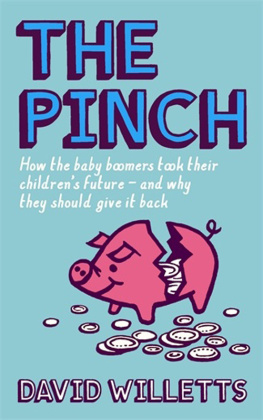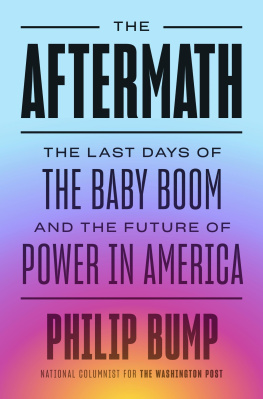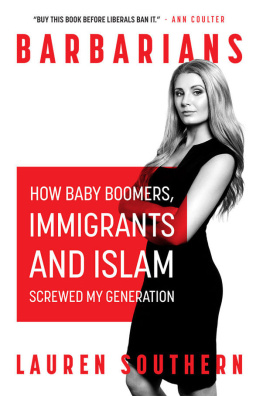Copyright
First published in hardback in Great Britain in 2010 by Atlantic Books, an imprint of Grove Atlantic Ltd.
Copyright David Willetts, 2010
The moral right of David Willetts to be identified as the author of this work has been asserted by him in accordance with the Copyright, Designs and Patents Acts of 1988.
All rights reserved. No part of this publication may be reproduced, stored in a retrieval system, or transmitted in any form or by any means, electronic, mechanical, photocopying, recording, or otherwise, without the prior permission of both the copyright owner and the above publisher of this book.
Every effort has been made to trace or contact all copyright holders. The publishers will be pleased to make good any omissions or rectify any mistakes brought to their attention at the earliest opportunity.
ISBN: 978-0-857-89142-6
First eBook Edition: January 2010
Atlantic Books
An imprint of Grove Atlantic Ltd
Ormond House
2627 Boswell Street
London
WC 1 N 3 JZ
www.atlantic-books.co.uk.
To Imogen and Matthew
Contents
List of Tables
Acknowledgements
I have of course learnt much from my constituents in Havant. The problems of the stream of young people coming to my surgery who were trying to do the right thing for their families but were unable to find an affordable place to live particularly set me thinking about the debt we owe them.
I am very grateful to successive researchers who have been of great assistance, particularly Melanie Batley, Henry Cook, Ryan Shorthouse and Laura Fox. Annie Winsbury and Helga Wright provided invaluable support. Gervas Huxley has been an encouraging friend throughout. Nick Hillman has been a great source of wisdom and advice. I have a particular debt to Chris Cook for his wide-ranging research on the book. Georgina Capel, my agent, believed in the project from the beginning. Caroline Knight of Atlantic Books has been a shrewd editor. Responsibility for any errors is of course mine alone.
I have a further debt to the wider academic and research community in Britain and sometimes abroad as well. Rein Jansons of the LSE, Edmund Cannon of Bristol University, Alistair Muriel of the IFS, Bob Pannell of the Council of Mortgage Lenders and Alan Holmans of Cambridge University have provided research on specifc issues. But the debt goes wider than that. During my time as a Visiting Fellow at Nuffisseld College, Oxford, for example, John Goldthorpe generously gave time to educate me on social mobility, John Mullbauer on housing and Paul Klemperer on game theory. I have greatly benefited from participating in the wide-ranging conferences held at the Ditchley Foundation. Dr Paul Redmond at Liverpool University shares my fascination with the divergent attitudes of successive generations. Social policy experts at the LSE, especially Nick Barr and John Hills, have helped me think about the welfare state and the life cycle. John Ermisch of the Institute for Social and Economic Research and Geoff Dench of the Young Foundation have helped me to understand family change, distinguishing between cohort and life-cycle effects. Paul Gregg and Simon Burgess of the CMPO at Bristol University shared their researches on education and social mobility, as did Jo Blanden; Anna Vignoles of the Institute of Education generously reviewed that whole chapter. Professor Ken Binmore of Bristol and UCL has thought deeply about game theory and its applications to public policy, and his work above all stimulated me to set out some ideas in an earlier lecture at the LSE. Daniel Finkelstein of The Times and Matthew Taylor of the Royal Society of Arts share my interest in trying to apply insights from this discipline and evolutionary biology to politics, an approach whose time has come. Matt Ridley has also helped guide me through the literature on this. I have benefited from many discussions on saving and investment with Martin Weale of the National Institute of Economic and Social Research and Andrew Smithers of Smithers and Co. Together with Martin Woolf of the Financial Times they persuaded me early on of the importance of national saving rates in explaining what was going wrong with our economy. Dieter Helm of Oxford University links that to the importance of investment, especially in infrastructure. At events at the Royal Society and elsewhere Martin Rees and John Beddington have introduced me to scientists understanding of the challenges facing us over the next forty years.
Research institutes such as the Institute for Fiscal Studies and the Sutton Trust have been valuable research resources. Policy Exchange hosted the first event, back in 2005, when I attempted to set out some thinking on the shifts in wealth between the generations. Mervyn King of the Bank of England responded encouragingly to my interest in the links between demography and economics, and officials at the Bank have shared some of their data. Philip Booth of the IEA and Nick Bosanquet of Reform have both tackled this issue as well. The National Centre of Social Research and James Lloyd, then of the International Longevity Centre, provided their analyses of the distribution of income and assets which the National Centre generously updated for this book. Kate Barker took me through her work on housing. Adair Turners reports on pensions provided excellent analytical material. David Coleman of Oxford University has shared his wide understanding of demography. Sitting on the Global Ageing Commission run by the Center for Strategic and International Studies in Washington DC gave me an opportunity to think about demographic change as an international phenomenon. Many other experts, especially from the worlds of education and pensions have patiently shared their knowledge with me. Punter Southall have given me the opportunity to continue to think about pensions after my front bench responsibilities ended.
More than a decade in Opposition could be sterile and frustrating. It is because of the generosity of so many people in univer sities and research institutes that I have found them intellectually fruitful and I wish to acknowledge my debt and gratitude.
My wife Sarah has shaped the thinking in this book more than she may know. She has always judged every family question by what is best for our two children. This book is dedicated to them.
Introduction
We all know the story. The parents return home from a night away to find a teenage party has got out of hand and the house has been trashed. Every few months a particularly dramatic episode gets into the media with distraught parents tidying up a mess left by a swarm of young people summoned on Facebook. It plays to a deep-seated fear that younger people will not appreciate and protect what has been achieved by the older generation. This is the eternal anxiety of each generation about what comes after. But what if, when it comes to many of the big things that matter for our futures, it is the other way round? What if its actually the older generation, the baby boomers, who have been throwing the party and leaving behind a mess for the next generation to sort out?
The boomers, roughly those born between 1945 and 1965, have done and continue to do some great things but now the bills are coming in; and it is the younger generation who will pay them. We have a good idea of what at least some of these future costs are the cost of climate change, the cost of investing in the infrastructure our economy will need if we are to prosper, the cost of paying pensions when the big boomer cohort retires, on top of the cost of servicing the debt the government has built up. The charge is that the boomers have been guilty of a monumental failure to protect the interests of future generations.








